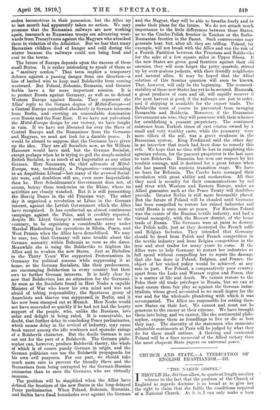OUR ALLIES IN CENTRAL EUROPE.
THE Allied statesmen in Paris seem at last to have recognized their duty to our friends, in Central Europe. A great deal of sentiment, partly genuine and partly malicious, has been expended on the Germans, the Austrians, and the Hungarians ; even the inhuman Bulgars have their credulous admirers. But we have heard far too little of the Poles, the Bohemians, the Rumanians, and the Serbs, who look up to the great Allies as their saviours. These small nations have suffered most of all during the war. Poland, Rumania, and Serbia have been scientifically devastated by the enemy. They have been robbed of their foodstuffs, their industrial machinery, and their railway material. Bohemia alone has not been laid waste, but she, like the others, has lost vast numbers of her able-bodied men, who fell in battle for an alien rule, or were murdered in Austrian prisons, or perished while defending the Allied cause in Russia. For ourselves, when we contemplate the chaos in Central Europe, we think first of these brave little nations, and regard their claim to consideration as infinitely superior to that of the enemy peoples. We do not say that the Germans and Magyars, who deliberately made the war and fell upon their peaceful neighbours with more than mediaeval ferocity, should be left to suffer from the evils which they have brought upon themselves. It is not in our nature, nor is it to our interest, to let these criminal races starve and riot. But we are sure that the nations now freed from German and Magyar oppression have a right to be fed and clothed and equipped with all that an industrial community needs for carrying on its daily work even before we concern ourselves with the condition of the enemy. As it is, the Allies have been extremely remiss in helping these small nations. There has been a good deal of talk about a " sanitary cordon " against the Russian Bolsheviks. But the Allied peoples who are to form this cordon from the Baltic to the Black Sea have been left very much to their own devices. The Polish Legions who served under General Haller in France are only now beginning to arrive in Poland, where their presence was urgently required last November. German chicanery about Danzig has been allowed to delay the arrival of this efficient Polish Army, which will give a new meaning to Polish independence. Another small fact illustrating the same point came out the other day in connexion with Rumania. When the enemy evacuated that country he took away with him almost every loco- motive and truck that he could find. The result was a complete paralysis. For want of transport Rumania could not begin to restore her trade, she could not feed her townspeople from the scanty stores that had been overlooked by the Germans and Magyars, she could not move her troops. The Magyars had hundreds of the
stolen locomotives in their possession, but the Allies up to last month had apparently taken no action. We may presume that the Rumanian railways are now worldng; again, inasmuch as Rumanian troops are advancing west- wards from Transylvania against the Magyars who attacked them in violation of the .Liistice. But we fear that many Rumanian children died of hunger and cold during the winter because the railways could not bring food and coal to the towns.
The future of Europe depends upon the success of these small States. It is rather misleading to speak of them as a " sanitary cordon." That term implies a temporary defence against a passing danger from one direction—a line of barbed wire to keep mad Bolsheviks from coming westward. But Poland, Bohemia, Rumania, and Greater Serbia have a far more important mission. It is to protect Russia against Germany, as well as to defend Western Europe against Russia. They represent the Allies' reply to the German dogma of Mittel-Europa--of a Central Europe controlled absolutely in German interests from Berlin, and exerting an unassailable domination over Russia and the Near East. If we have not pulverized the Mittel-Europa design by our victory, we have fought in vain. If we have not liberated for ever the Slave of Central Europe and the Rumanians from the Germans and Magyars, we need not look for a durable peace. It would be absurd to suppose that the Germans have given up the idea. They are all Socialists now, as Sir William Harcourt would have said, but the German Socialist, except perhaps when he is trying to gull the simple-minded British Socialist, is as much of an Imperialist as any other German. Herr Naumann, the chief advocate of Mittel- Europa, was, technically, a Progressive—corresponding to an Asquithian Liberal—but many of the avowed Social- ists were, and doubtless still are, even more Imperialistic than he. Herr Scheidemann's Government does not, of course, betray these tendencies on the Rhine, where its activities are closely watched. But it is still persecuting the Slesvig Danes in the old Prussian way. The other day it organized a revolution at Libau in the German interest, against the Lettish Government which the Allies have recognized. It has conducted an almost continuous campaign against the Poles, and is credibly reported, despite Mr. Lloyd George's confident assertions to the • contrary, to be organizing a considerable army under Marshal Hindenburg for operations in Silesia, Posen, and West Prussia when the Allies have demobilized. We may be sure, too, that Germany will raise trouble about the German minority within Bohemia as soon as she dares. Meanwhile she is using the Bolsheviks to frighten the Allies and to weaken the new States. Just as Richelieu in the Thirty Years' War supported Protestantism in Germany for political reasons while suppressing it at home, so the German Socialists, like their predecessors, are encouraging Bolshevism in every country but their own to further German interests. It is fairly clear by now that Bolshevism has no attraction for the Germans. As soon as the Socialists found in Herr Noske a capable Minister of War who knew his own mind and was not afraid of taking responsibility, the Spartacus group of Anarchists and thieves was suppressed in Berlin, and it has now been stamped out at Munich. Herr Noske would not have succeeded so quickly if he had not had the hearty support of the people, who, unlike the Russians, love order and delight in being ruled. It is conceivable, no doubt, that further delay in concluding Peace preliminaries, which means delay in the revival of industry, may cause fresh unrest among the idle workmen and sporadic risings of a Bolshevik character. But the docile German is not cut out for the part of a Bolshevik. The German philo- sopher can, however, produce Bolshevik theory, the whole of which is of course purely German in origin, and the German politician can use the Bolshevik propaganda for his own evil purposes. For our part, we should take much more care to prevent the friendly Slays and the Rumanians from being corrupted by the German-Russian emissaries than to save the Germans, who are virtually immune.
The problem will be simplified when the Allies have defined the frontiers of the new States in the long-delayed Peace preliminaries. When Poland, Bohemia, Rumania, and Serbia have fixed boundaries over against the German
and the Magyar, they will be able to breathe freely and to make their plans for the future. We do not attach much importance to the little differences between these States, as to the Czecho-Polish frontier in Tesohen or the &rho- Rumanian frontier in the Banat. Such controversies may generate heat, but, after all, they are trifling. Poland, for example, will not break with the Allies and run the risk of a Fourth Partition between the Prussians and Bolsheviks for the sake of a few square miles in Upper Silesia. If the new States are given good frontiers against their old enemies, they will soon forget the petty quarrels, stirred up by over-zealous pedants, with their friendly neighbours and natural allies. It may be hoped that the Allied solution of this frontier question will soon be known. That, however, will only be the beginning. The economis stability of these new States has yet to be secured. Rumania, a great producer of corn and oil, will rapidly recover if the next harvest is good, if the railways are put in order, and if shipping is available for the export trade. The Bolsheviks must of course be prevented from ravaging Bessarabia and Moldavia. Moreover, if the Rumanian Government are wise, they will persevere with their schemes for establishing a peasant proprietary. The continued existence from Turkish times of vast estates owned by a small and very wealthy caste, while the peasantry were mere tillers of the soil, was a grave weakness in the Rumanian system. King Ferdinand said the other day in an interview that much had been done to remedy this evil. - We hope that no time will be lost in completing this agrarian reform, for the peasant proprietor is the last man to turn Bolshevik. Rumania has won our respect by her resolute courage, and is destined for a great future when she has passed this anxious transition stage. We have no fears for Bohemia. The Czechs have managed their revolution with great ability and moderation. All that they need is security for their communications by rail and river with Western and Eastern Europe, under an Allied guarantee such as the Peace Treaty will doubtless provide. Greater Serbia is still more favourably placed. But the future of Poland will be clouded until Germany has been compelled to restore her ruined industries and until Russia is once more at peace. For Russian Poland was the centre of the Russian textile industry, and had a virtual monopoly, with the Moscow district, of the home trade of Russia. The Germans were at pains to destroy the Polish mills, just as they destroyed the French mills and Belgian factories. They intended that Germany should be freed from Polish and Frenoh competition in the textile industry and from Belgian competition in the iron and steel trades for many years to come. If the Allies were to help Germany to restart her industries at full speed without compelling her to repair the damage that she has done in Poland, Belgium, and France, the object of her wicked policy would be achieved, at any rate in part. For Poland, a comparatively poor country apart from the Lodz and Warsaw region and Posen, this is a matter of life and death. We cannot restore to the Poles their old trade privileges in Russia, but we can at least ensure them fair play as against the German indus- trialists, whose greed accounted in no small degree for the war and for the wholesale plundering with which it was accompanied. The Allies are responsible for setting these new States on their feet. We cannot and must not be generous to the enemy at their expense. We have brought them into being, and we cannot, like the sentimental philo- sopher, expose them as foundlings to live or die as best they may. The sincerity of the statesmen who enunciate admirable sentiments at Paris will be judged by what they do for these small nations. A thriving and contented Poland will be a finer memorial of the Allied victory than the most eloquent State papers on universal peace.







































 Previous page
Previous page